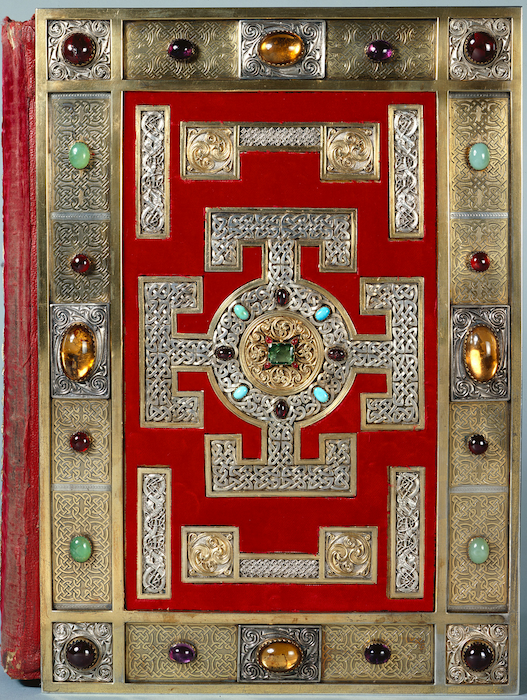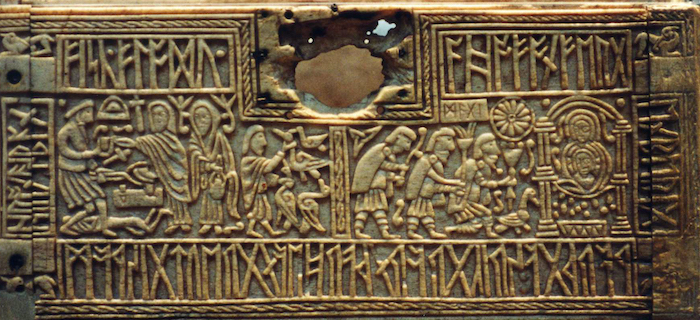Exeter Riddle 95
MEGANCAVELL
Date: Wed 17 Feb 2021Matching Commentaries: Commentary for Exeter Riddle 95
Riddle 95’s translation is by Brett Roscoe of The King’s University, Alberta. Thanks for taking on the very last Exeter riddle, Brett!
Ic eom indryhten ond eorlum cuð,
ond reste oft; ricum ond heanum,
folcum gefræge fere (1) wide,
ond me fremdes (2) ær freondum stondeð (3)
5 hiþendra hyht, gif ic habban sceal
blæd in burgum oþþe beorhtne god. (4)
Nu snottre men swiþast lufiaþ
midwist mine; ic monigum sceal
wisdom cyþan; no þær word sprecað
10 ænig ofer eorðan. Þeah nu ælda bearn
londbuendra lastas mine
swiþe secað, ic swaþe hwilum
mine bemiþe monna gehwylcum.I am noble and known to men of rank,
and I rest often; to rich and poor,
to people far and wide I am known,
and to me, formerly estranged from friends, remains
5 the hope of plunderers, if I should have
honour in the cities or bright wealth.
Now wise men above all cherish
my company; to many I must
tell of wisdom, where they speak not a word,
10 nothing throughout the earth. Though now the sons of men,
sons of land-dwellers, eagerly seek
my tracks, I sometimes hide
my trail from all of them.Notes:
This riddle appears on folio 130v of The Exeter Book.
The above Old English text is based on this edition: Elliott van Kirk Dobbie and George Philip Krapp, eds, The Exeter Book, Anglo-Saxon Poetic Records 3 (New York: Columbia University Press, 1936), page 243.
Note that this edition numbers the text Riddle 91: Craig Williamson, ed., The Old English Riddles of the Exeter Book (Chapel Hill: University of North Carolina Press, 1977), pages 120-1.
Translation Notes:
- (1) The manuscript reads fereð. Williamson takes hiþendra hyht as the subject of fereð wide, translating, “The plunderers’ joy (gold) travels far, and, once estranged from friends, stands on me (shines from me?), if I should have glory in the cities or bright wealth” (pp. 398-99). Murphy translates, “The plunderer’s joy travels widely and stands as a friend to me, who was a stranger’s before, if I am to have success in the cities or possess the bright Lord.” See Patrick J. Murphy’s Unriddling the Exeter Riddles (University Park, PA: Pennsylvania State University Press, 2011), page 87.
- (2) The manuscript fremdes does not make sense because there is no genitive noun in the sentence. I follow Williamson’s suggestion in reading this as fremde (pages 399-400).
- (3) Stondeð literally means “stands,” so a literal translation would be “stands on me.” But the meaning may be understood as “remains (to me)” or “falls to my lot” (Williamson, page 400).
- (4) Here I have followed the suggestion of numerous editors in assuming that beorthne should be beorhte, an adjective describing god, which here means “goods” or “wealth.” See Williamson, page 401.
Tags: anglo saxon exeter book riddles old english solutions brett roscoe riddle 95
Related Posts:
Exeter Riddle 26
Exeter Riddle 29
Exeter Riddle 83




Commentary for Exeter Riddle 94
MEGANCAVELL
Date: Wed 09 Jun 2021Matching Riddle: Exeter Riddle 94
Riddle 94’s commentary is also by Erin Sebo, senior lecturer in English at Flinders University in Australia. Take it away, Erin!
Riddle 94 is one of the most fragmented riddles in the Exeter Book. It is often ignored and even left out of translations, such as in Kevin Crossley-Holland’s excellent translation. Just enough survives for it to be identified as a creation riddle, a version of the same idea found in Riddles 40 and 66. Which seems to make it even less interesting: why waste time on a few disconnected words when we have two complete versions of the riddle already as well as Aldhelm’s original Latin version?!
But, actually, the fact we have something to compare this riddle to – an absolute luxury in Old English literature – means that it is possible to learn things that we can’t with texts that survive in one version (or one manuscript!). In this case – as I argued in my book – because we have different versions of the same text, we can see a range of different popular cosmological and astronomical ideas, and possibly even get a hint of how these ideas changed over time.
Photo of stars rotating (by Jordan Condon) from Wikimedia Commons (licence: CC BY 3.0).
Riddle 94 draws on much of the imagery of Riddles 40 and 66 and is also based around a series of comparatives, but the form is simplified, perhaps suggesting it was composed later or had circulated in popular culture. Often we have lost what is being compared but we can still tell the order of these images – and that’s revealing. For example, the riddles doesn’t begin with the large celestial comparatives “higher than heaven” and “brighter than the sun.” Both are demoted to after whatever thing was designated “smoother.” It’s an odd choice. The other creation riddles start with the celestial…and what could the universe be smeþr (smoother) than that could be theologically and cosmologically important enough to earn it a place above the heavens and the sun? There is no other instance of smeðe in its comparative form in the Old English corpus so the comparison was not common. Obviously, this riddle was doing something new.
The seven surviving adjectives in Riddle 94 are: smeþr (smoother), hyrre (higher), glædre (brighter), smeare (sharper), leofre (dearer) and leohtre (lighter). Since these are virtually all we have to go on, it’s worth looking at how they’re used elsewhere. The first, smoother is not found in Riddles 40 or 66, but Aldhelm and Symphosius use a Latin equivalent, teres (smooth), for the stars – in Aldhelm’s Enigma 100, De Creatura (line 57) and the horn casing of a lantern in Symphosius’s Enigma 67, Lanterna (line 1), respectively. The next adjective, higher, in very common and usually contrasts heaven or heavenly things with infernal depths. Brighter, the next, refers to the sun. It seems the obvious adjective to moderns but actually the sun is usually described as swift in Old English poetry. (Riddle 66 describes the moon as brighter!)
Sun vs Moon in a late 15th-century calendar by Johannes von Gmunden from Wikimedia Commons (public domain).
Smeare, especially in the metaphorical sense in which it applies to salt, is absent from earlier creation riddles, though Aldhelm makes saltiness a comparative in its own right. Leofre is equally absent from Riddle 94’s antecedents and it is the first instance of a “subjective” quality: something may only be dear if it is dear to someone. Leohtre, the last, is more fraught since we can’t be sure if it’s used in the sense of “brighter” or “less weighty.”
These last two form the most complete line of the fragment: “dearer than all this light, lighter than…” Unlike the other Creation riddles which have dualistic parings, this seems to be associative – for a sense of how unusual this is, it’s worth comparing it with “religious” cosmological descriptions. The most influential of these is the creation of the world in the Book of Genesis which works through a hierarchy of oppositions, starting with the division of earth and heaven, then light, then sky from sea, then sea from land. This basic structure is echoed elsewhere, such as this description of God’s power in Homily 5 of the Vercelli Book: his miht is ufor þonne heofon & bradre þonne eorðe & deopre þonne sæ & leohtre þonne heofones tungel (Scragg, page 121, line 194) (…His might is higher than heaven, and broader than the earth, and deeper than the sea and lighter than Heaven’s star).
This is a version of the “creation comparatives,” which conforms to the Christian structure and order of the images in Genesis. God makes Heaven (ufor þonne heofon), then separates the land (bradre þonne eorðe) from the sea (deopre þonne sæ) and then sets the celestial bodies on their trajectory (leohtre þonne heofones tungel).
Although this riddle in its fragmented state is easy to ignore, it survived long after most of the Exeter Book riddles were forgotten (except by scholars). Unlike most of the Exeter riddles, Riddle 94 is the first which is not characterized by word pictures, instead favouring a stable structure into which any number of formulaic elements may be fitted. This makes it far better suited to popular riddle-telling (as opposed to riddle reading) than most in the Exeter Book. And that’s what happened. The question implicit in Riddle 94’s statement that Creation is “higher than heaven” becomes overt in a 1430 lyric “Inter Diabolus et Virgo”* (Rawlinson MS. D. 328, folio 174b): “What ys hyer than ys…?” Each adjective is turned into its own question and new adjectives are added. The lyric survives as a ballad into the 19th century, when it was collected by the folklorist Francis James Child who made it the first ballad in his monumental collection, The English and Scottish Popular Ballads, under the title “Riddles Wisely Expounded”. Anything set to music tends to survive and you can even find the very last traces of “Riddles Wisely Expounded” in Tom Waits’ 2006 recording of “Two sisters” on Orphans: brawlers, bawlers and bastards (Sebo, page. 136). Go have a listen!
*Don’t @ me, I know what case inter takes.
References and Suggested Reading:
Crossley-Holland, Kevin, trans. The Exeter Book Riddles. London: Enitharmon, 2008.
Scragg, D. G., ed. The Vercelli Homilies and Related Texts. Early English Text Society 300. Oxford: Oxford University Press, 1992.
Sebo, Erin. In Enigmate: The History of a Riddle, 400–1500. Dublin: Four Courts Press, 2018.
Tags: anglo saxon exeter book riddles old english solutions erin sebo riddle 94
Related Posts:
Commentary for Exeter Riddle 40
Commentary for Exeter Riddle 66
Exeter Riddle 40
Exeter Riddle 66
Exeter Riddle 94